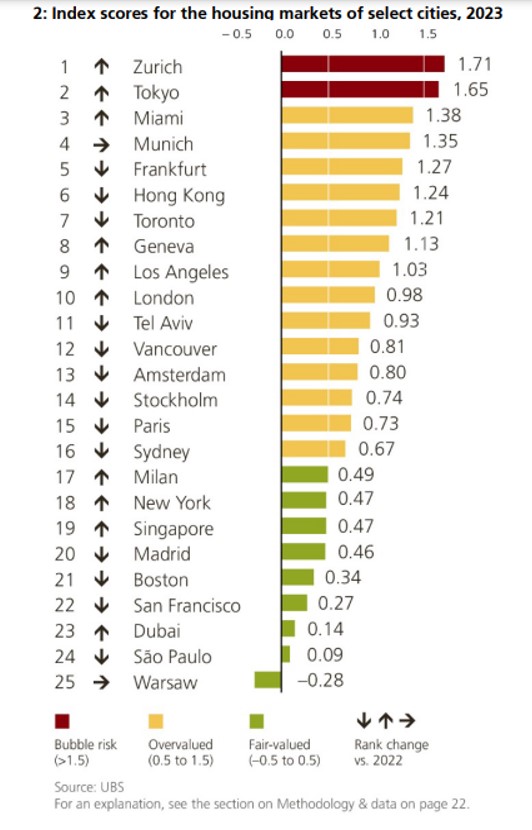Real Estate
Fewer Financial Centres Qualify For "Bubble" Status – UBS

While not pointing to an implosion of the "bubbles" in past property markets, the UBS study suggests that at least for the time being, the heat has gone from certain real estate markets in major financial centres.
Zurich (pictured) and Tokyo remain the cities at the top of the
“bubble risk” category as measured by UBS in one of its regular reports
examining the state of real estate markets in global financial
centres.
However, the Japanese and Swiss cities are the only cities that
belong in the bubble category, the Swiss banking group said in
its UBS Global Real Estate Bubble Index 2023 report. In 2022,
nine cities belonged in this bracket.
Formerly in the bubble risk zone – Toronto, Frankfurt,
Munich, Hong Kong, Vancouver, Amsterdam, and Tel
Aviv – are now all in the overvalued territory, rather
than the “bubble” end, UBS said.
Unchanged from the previous year, housing markets in Miami,
Geneva, Los Angeles, London, Stockholm, Paris, and Sydney also
continue to be overvalued, it said. Similarly, New York, Boston,
San Francisco, and Madrid have experienced a drop in imbalances.
These housing markets are now “fairly” valued, according to the
index, as are Milan, SĂŁo Paulo, and Warsaw. This also applies to
Singapore and Dubai, even though their reputation as geopolitical
safe havens has recently triggered a surge in demand for both
renting and buying.
A year of rising interest rates, trade disruptions post-Covid and
the geopolitical chills caused by Russia’s invasion of Ukraine
have, alongside other factors, deflated some of the property
sector “bubbles” in particular cities.
House price growth has suffered due to rising financing costs as
average mortgage rates have roughly tripled since 2021 in most
markets. Annual nominal price growth in the 25 cities analysed
came to a standstill after a 10 per cent rise a year ago, UBS
said.
“In inflation-adjusted terms, prices are actually 5 per cent
lower now than in mid-2022. On average the cities lost most
of the real price gains made during the pandemic and are now
close to mid-2020 levels again,” Claudio Saputelli, head of real
estate at UBS Global Wealth Management’s Chief Investment Office,
said.
In Frankfurt and Toronto – the two cities with the highest risk
scores in last year’s edition – real prices tumbled by 15 per
cent in the last four quarters. A combination of high market
valuations and relatively short mortgage terms also put prices
under strong pressure in Stockholm and to a lesser degree in
Sydney, London, and Vancouver. In contrast, in Madrid, New York,
and São Paulo – cities with moderate risk valuations so far –
real home prices have continued to rise at a moderate pace.

Source: UBS